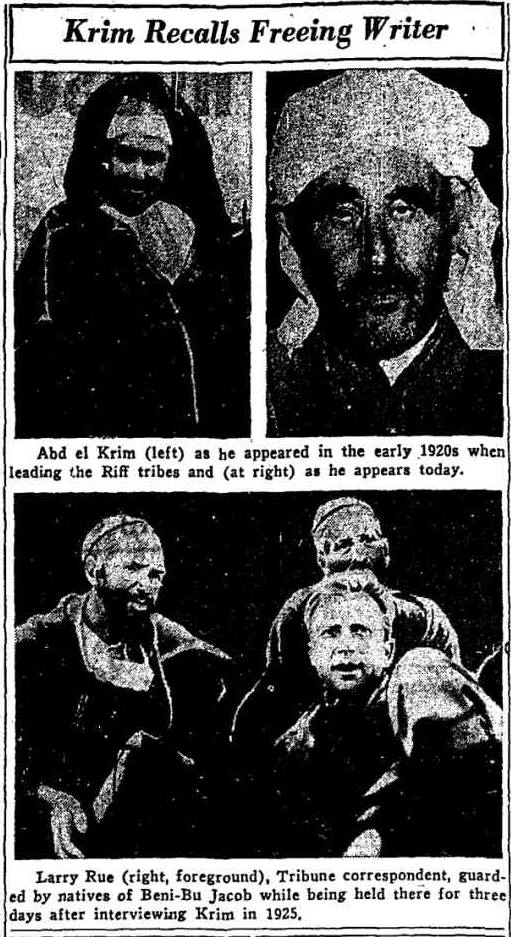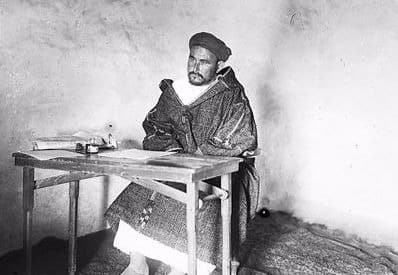Article by Larry Rue from the Chicago Tribune (June 21, 1953)
Tribune Writer Talks with Exile in Egypt
CAIRO, Egypt, June 20-One night I met a handsome, young lieutenant in the roof garden of the Semiramis hotel. When I heard his name, I asked, “Any relation to Abd el Krim, the great Riffian leader?” “Yes, he is my father.” “Give him my warmest regards,” I said.
The next day the son telephoned. “My father remembers you well. When can you come and see him?”
Krim in 1921 organized the tribes of the Rif, the wild, hilly country back of the Mediterranean coast of Morocco, in a successful rebellion against the Spaniards. With a band of adventurers and ex-soldiers of many nationalities, Krim seized control of most of Spanish Morocco and held it until he was put down by combined French and Spanish forces in 1925. He was exiled to Madagascar. His exploits have been celebrated in songs and poems, among them Sigmund Romberg’s “Desert Song.”
Son Born In Exile
Krim’s son called for me in a late model American car. On the ride to the home where Abd el Krim now lives I asked the son whether he had a yearning to go to the Rif.
“Of course, I want to go there. I’ve never seen our home, I was born in exile,” he replied.
The car sped toward Heliopolis; turned into a tree lined, modern residential area, Koubbe Garden; passed thru a gate in a high stone wall and then stopped in a garden in front of a small but impressive palace. Here the Riffian leader and his family-there are 11 children, six sons and five daughters-most of whom are now grown up, have been living since they escaped from a French ship in the Suez Canal zone in 1947.
The French were taking them from Madagascar to another exile when they escaped. The Arab League put the palace at Abd el Krim’s disposal, and is now paying him a subsidy of around $1,000 a month to live on.
Son Is Interpreter
The lieutenant spoke French fluently and told me he had been brought up in a French Catholic school in Madagascar. His older brother, who speaks English perfectly, served as interpreter for his father.
Members of the family, but not the father, have permission to go to France. Neither France nor Spain would allow any of them to return to the Riff. It is feared their presence there might stir explosive nationalism in North Africa.
I was escorted up a few marble steps thru a double door into what once must have been a huge oval portico. It was partitioned in two by a large rug reaching from ceiling to floor. In one corner were a settee, several chairs, and a man dressed in a simple burnoose talking to two men in civilian clothes. When I was let in, the two men made their excuses and left. I was beckoned to have a seat.
Thinner, Face Sharper
I doubt that I would have recognized Krim had I met him by accident at some other place. At 72 he is much thinner and his body has shrunk. His face once broad and full, seems to have contracted and sharpened. Perhaps this is only natural, for it was 28 years ago when I saw him last.
Then he was leading the fight for the independence of the Rif. Tho he never mustered more than 25,000 fighting men, he had been successful in his operations against the Spaniards and in the preliminary skirmishes against the French.
Spain and France seldom have agreed on anything. But this time they formed a military alliance against Krim. It was only after extensive operations that they overran the Riff and captured him. Abd el Krim and his family were sent into exile to the French island of Madagascar.
Run Spanish Blockade
When I first met Krim, I, with a Rif guide, had run thru a Spanish naval blockade in a 14 foot launch from Tangier. We went around the Ceuta peninsula, to a point on the coast not far from the Bay of Alhucemas. To meet him now was much simpler.
“You are the one who came in the boat,” he said. His eldest son translated.
“I was your prisoner, too, for several days after having been a highly honored guest,” I said.
He remembered.
I had spent a week at Abd el Krim’s headquarters and then headed for the Spanish front. I intended to cross no man’s land under a flag of truce. My excuse was that I was carrying peace terms. It was a three days’ walk, or donkey ride, and three men accompanied me as guides.
Visits Krim’s Brother
The first night we stopped with Abd el Krim’s brother who was holding a concealed fort on Alhucemas bay. In the center of this bay the Spaniards held an island.
The brother showed me around his fortifications. There were several dug-in 75s. I had taken my leave and was more than half an hour’s walk away when the Spaniards for the first time began shelling Abd el Krim’s fortifications, and with deadly accuracy. My escort immediately attributed that shelling to me.
I must have sent some kind of signal to that island, the escort believed. My status immediately changed that of, an honored guest to that of a suspected spy. I was held prisoner for three days.
Grateful for Release
“The moment I heard they were holding you,” Abd el Krim said, “I ordered your release.”
I told Krim I still felt grateful for my being set free adding that I had felt then the odds were too big against him and he was fighting a losing battle.
“I have still not given up,” he said. “Tho I am 72 years old I still hope I will live to see my homeland again, and to see it free.”
It was Ramadan, the Moslem month of fasting. Those who observe it do not let a drop of water nor food pass their lips between sunrise and sunset. Abd el Krim was observing Ramadan, and it was still two hours before sunset. He asked whether I would like some coffee. I thanked him. As he was abstaining I could do so, too, the few minutes with him. But he insisted and called a servant to bring Turkish coffee and a glass of water.
Another Writer Periled
Abd el Krim reminded me of an incident in the early days of the Riffian war. A Spanish plane had flown around the outpost where he temporarily had made his headquarters. It made a pass as if going to strafe him and a correspondent with him.
“You remember we did not go into the shelter because I wanted you to go first and you refused to go before me,” he said. “Luckily for us that plane did not use its guns-perhaps they got jammed-for we would have been hit had they worked.”
I did not recall this incident, explaining if that had happened I would have had notion about jumping into a fox hole either before or after him. I suggested the correspondent with him might have been Vincent Sheean of The Chicago Tribune, who had interviewed him some time before I was there.
After some reflection he said, “Vincent Sheean, also Chicago Tribune. . . . Yes, yes, I think that was who it might have been.”
Asks the Questions
Many questions came to mind. But before I could get them put in form that would not be just making conversation, or put them in a way to be least offensive, he had taken the initiative and started asking questions himself.
He asked what I thought was going to happen in Morocco, in Korea . . . with Russia? How was it that a country like the United States, that had to fight for its own independence, possibly could help countries that are keeping the Arabs from becoming free? In fact, even supply them weapons to fight those who want nothing but independence?
In a recent trip thru the Arab countries that question was put to me time and again. I did not give an answer.
Strong Heart Survives
Abd el Krim said he was keeping in touch with what is going on in North Africa. He has many visitors. “I still feel optimistic enough to hope I will see my country free before I die,” he reiterated.
All the time we were talking I was impressed with a sense of real tragedy. Here was a great man, a courageous leader who had fought a big battle against hopeless odds. Yet that strong heart seems to have survived.
Something of the great spirit remained. The will still seemed unbroken. His home has now become a shrine to those Arabs fighting for their independence.
He walked with me out to the garden where the car was waiting. I noticed he still had the limp he acquired some thirty years before when he broke his leg trying to escape from a Spanish prison. We shook hands again.
Invited to Dinner
“Now remember,” he reminded me, “you promise to have dinner with me after Ramadan is over.”
I said I would if I were still in Egypt. I promised I would never come to Cairo without calling on him. As the car pulled away I could see for sure-he was smaller, thinner. And the thought flashed thru my mind, more than age has done that to that once vigorous body.


